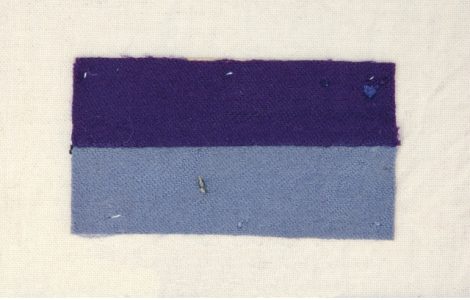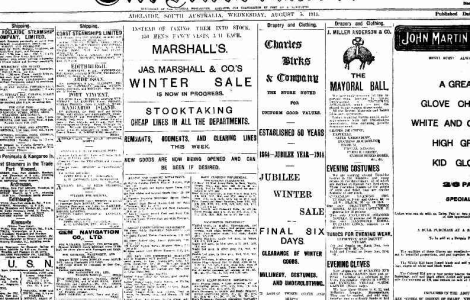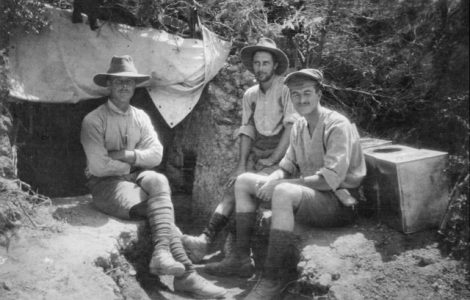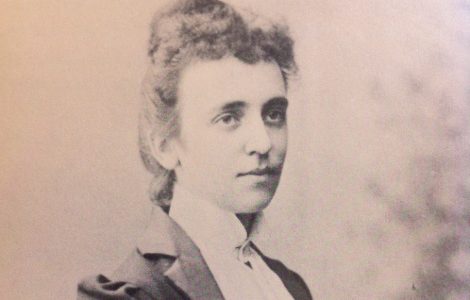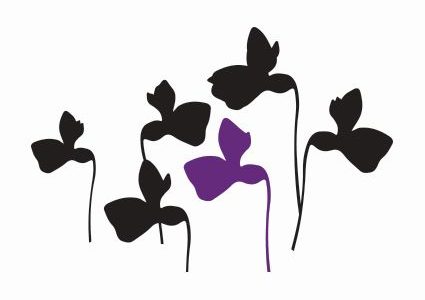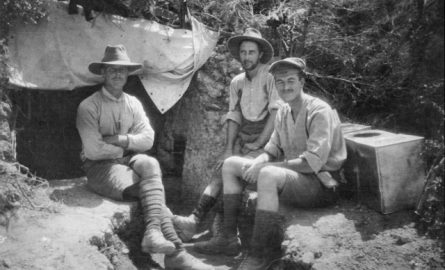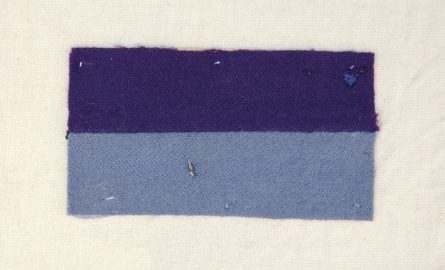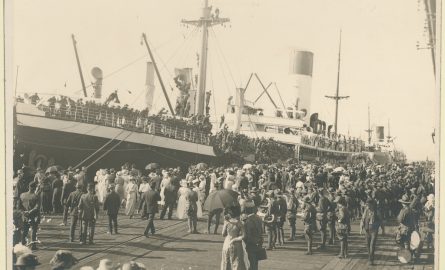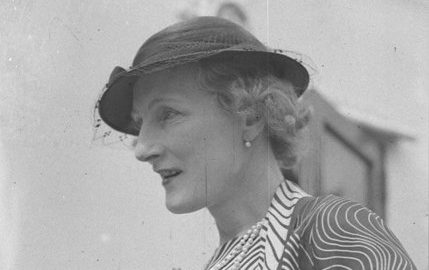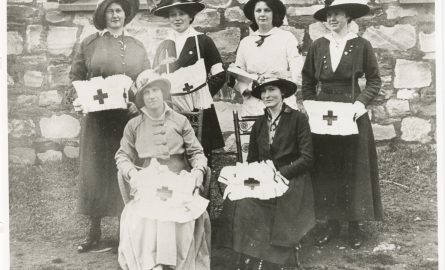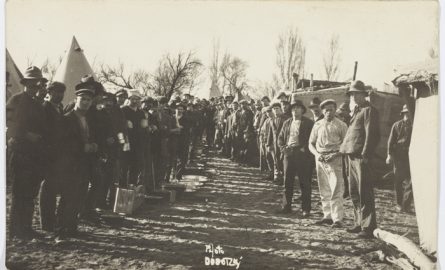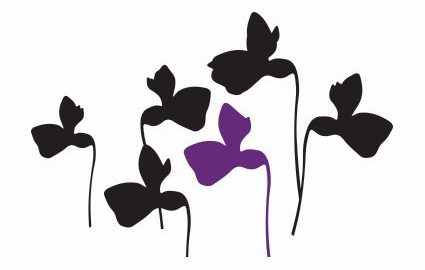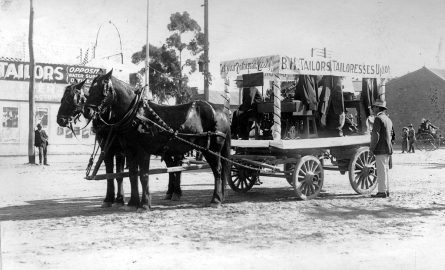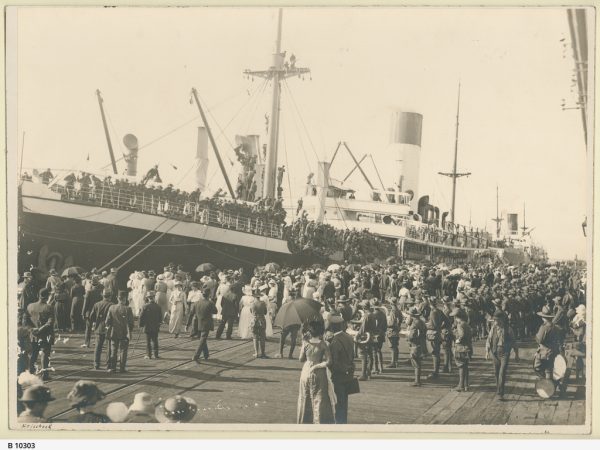
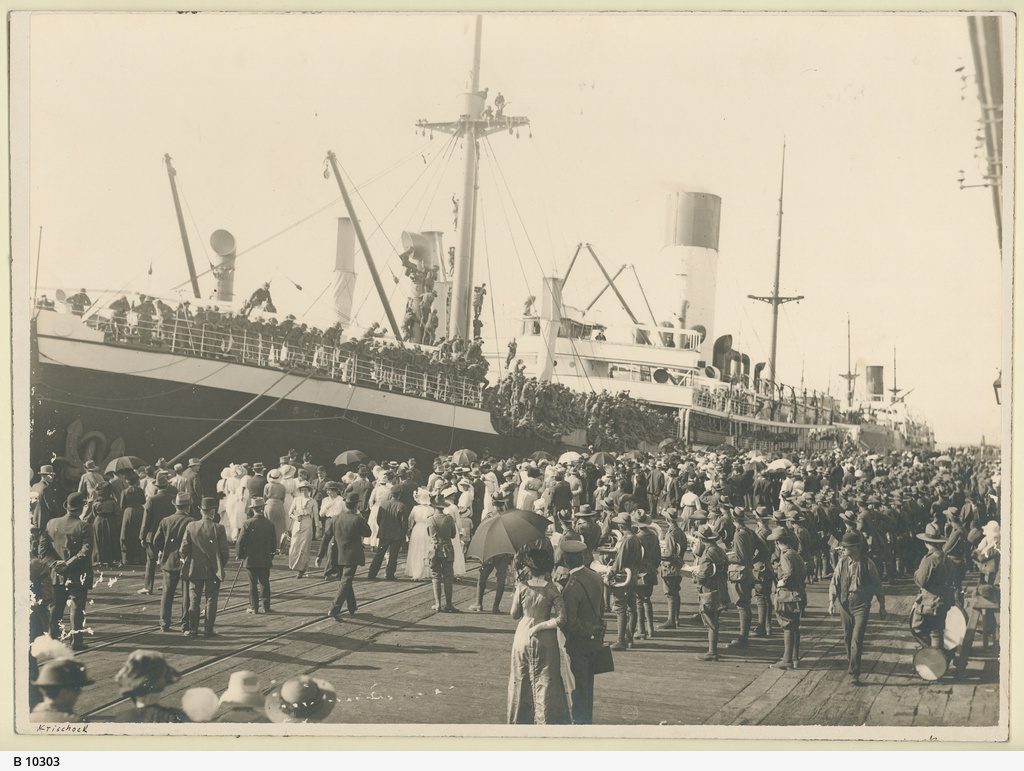
S.S. Ascanius, departing of the South Australian infantry of the first Australian expeditionary force. Image courtesy State Library of South Australia B10303
Glossary Terms
Topics
People
Terrell, Frederick Leopold, Cooper, Ethel, Lady Galway, Avery, Louis Willyama
Places
Organisations
October, 1914
This month: We meet another of our correspondents, Louis Willyama Avery as he prepares to set sail from Australia. We also find out about the movements of the 10th Battalion from the official Battalion diary. The war continues to dominate the press, but drought and unemployment are still major themes at home, although, no doubt, the Annual Goat Derby provided a little light relief!
DEPARTURE OF THE EXPEDITIONARY FORCES
South Australians didn’t know where men of the 10th Battalion who sailed on board the HMAT Ascanius from Outer Harbor on 20 October were bound. No doubt they assumed that they were headed for Europe. The daily headlines in the newspapers detailed the battles that were raging in Europe and the casualties that ensued. The 10th had prepared for their departure by bivouacking in the Adelaide Hills, and on Sunday 4 October, additional trains were scheduled to transport family and friends to Morphettville to visit the camp and say goodbye. Our new correspondent, Louis Avery, who had studied in Adelaide, boarded his ship in Melbourne, ready to depart for active duty.
FUNDRAISING AND CHARITY
While public farewells and patriotic fundraising continued, another element was introduced – a call for relief for the Belgian refugees who had been displaced by the fighting in their county. Every girl attending public school was asked to make at least one article of clothing for a Belgian child and every boy asked to give at least one penny. The Governor’s wife, Lady Galway, ensured that the donations were packed and forwarded appropriately. As President of the Red Cross, she also coordinated collections of clothes for soldiers at the front and towards the end of the month it was reported that 210 cases of garments had been shipped already.
Fundraising was also undertaken to purchase vital motor ambulances that would be used by the clearing hospital that South Australia was providing.
INTERNMENT OF GERMANS
Ethel Cooper’s letters from Leipzig emphasise her frustrations with the measures introduced against the English and Allies. Germans in South Australia were not faring any better. Torrens Island Internment Camp opened on 9 October and was a place of incarceration for ‘enemy aliens’ – nationals of countries at war with Australia. The War Precautions Act allowed them to be held without trial. Initially these prisoners had been held in a barbed-wire compound at Keswick Barracks, but as numbers grew, an alternative was required. Censorship ensured that most people were unaware of the Camp – the only mention of it in the Advertiser in October was to note the death by drowning of a 20 year old internee.
AROUND SOUTH AUSTRALIA
With the Adelaide Show having taken place in September, October was show season around the rest of the state, but drought and unemployment left a number of committees contemplating cancelling their events. Drought was also a significant issue in Adelaide, as people were prosecuted for illegal use of hoses.
The early arrival of summer heat also created a bushfire danger: three brothers perished in a fire near Loxton.
CELEBRATIONS FOR EIGHT HOURS DAY
A significant event in the calendar was the celebration of Eight Hours Day with a public holiday. In addition to the Annual Goat Derby, there was a street procession from Victoria Square, races at Morphettville, a football match between premiers, Port Adelaide and a team drawn from other clubs (Port won decisively!) and a vaudeville and picture show at the Exhibition building in the evening.
Ironically, there was some discussion in the paper about introducing a fourth shift in Port Pirie to make four six-hour shifts rather than three eight-hour shifts to keep more people in work. But either way, it was too late for Leo Terrell, whose diary is short on information for October – he is clearly depressed by his unemployment.
IN OTHER NEWS…
The new South Australian Museum building was a subject of some interest, but the war was slowing down efforts to open the new wing. In the meantime however, South Australians found entertainment visiting the Tivoli Theatre to see ‘The King of Jugglers’, Paul Cinquevalli.
We can imagine the mixed emotions of those South Australians as they said goodbye to friends and family before they boarded their troop ship. For many it was the first time that they had travelled away from home and while still searching for their sea legs, it would have been an emotional time, contemplating their new responsibilities, but also relishing the excitement.


